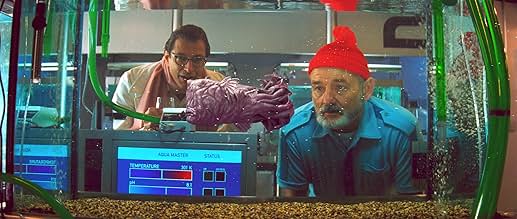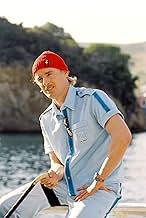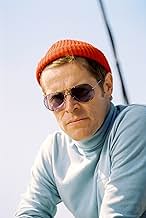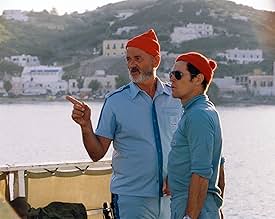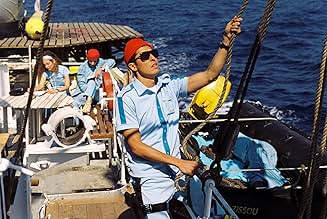Mit einem Plan, sich an einem mythischen Hai zu rächen, der seinen Partner getötet hat, trommelt der Ozeanograph Steve Zissou eine Besatzung zusammen, die seine entfremdete Frau, einen Journ... Alles lesenMit einem Plan, sich an einem mythischen Hai zu rächen, der seinen Partner getötet hat, trommelt der Ozeanograph Steve Zissou eine Besatzung zusammen, die seine entfremdete Frau, einen Journalisten und einen Mann einschließt, der möglicherweise sein Sohn ist.Mit einem Plan, sich an einem mythischen Hai zu rächen, der seinen Partner getötet hat, trommelt der Ozeanograph Steve Zissou eine Besatzung zusammen, die seine entfremdete Frau, einen Journalisten und einen Mann einschließt, der möglicherweise sein Sohn ist.
- Regie
- Drehbuch
- Hauptbesetzung
- Auszeichnungen
- 3 Gewinne & 10 Nominierungen insgesamt
Empfohlene Bewertungen
This might not be a popular opinion, but I feel like he's been pushing it with the artificiality too much in his recent films, to the point where I can't really engage with them emotionally. From a technical perspective, The Grand Budapest Hotel, Isle of Dogs, and The French Dispatch are all phenomenally well put together, meticulously crafted, and easy to appreciate when it comes to style/visuals. However, they just don't do it for me when it comes to feeling the film, or engaging with the characters. There's just a little too much detachment and/or too many characters. Maybe the films are too well put together. The human element that's apparent in his older films often feels missing.
With most of his stuff made before 2014, there's obviously that Wes Anderson style, but there's just a little more warmth and humanity. They're the right level of detached, to the point where they're not even really emotionally detached at the end of the day. His earlier films can be tremendously moving, and I think The Life Aquatic is a good example of that; the reality is heightened and the characters a little extreme, but not to the point where you detach emotionally. There's plenty of zaniness and quirky humour (not all of it perfect, but most of it works), but there's a heart to the whole thing, and I feel a similar way about The Royal Tenenbaums and maybe even Rushmore.
Maybe I miss the old Wes - I kind of love the old Wes, and I still appreciate the hell out of the new one, but something's missing. I fear the upcoming Asteroid City will be more new Wes than old Wes; it's like he keeps doubling down on it after it worked admittedly well in Grand Budapest Hotel.
Oh well. At least we'll always have Steve Zissou (the last 10-15 minutes of this also stands as the best sequence in Anderson's career so far, especially due to the perfect use of Sigur Ros).
To reiterate: more action oriented, funny as all get out, and quite possibly the funnest I've had in a theater all year.
But here, he does something different than what I have seen elsewhere from him. I think it is because the Owen influence is small here. The form is a movie about making a life which is a movie. Both the movie and the movie within have fantastic elements, but we do have a clear shift to brighter colors and crisper landscapes when within the inner world.
Its all based on synthetic notions of drama: love, purpose, worth. When you sneak up on things this way, you have to play a delicate game, one I think Wes usually flubs. You have to engage by setting a distance that is far enough from the norm that we as viewers can lean into it, and near enough to what we think of as real flesh that we want to.
Bill Murray doesn't understand this balance, because he's all about distance. Never mind, he's just an actor. So you select actors that try for the closeness. Dafoe and Blanchett get this. What they choose to do is simple: they form a real person and layer some cartoonish mannerisms on top. We see through the play and value the real underneath, where we cannot with Murray and Wilson.
Because the whole thing can blend together, we get a wonderful balance of this tension: engagement and studied apartness. I credit Anderson with maintaining this container. It works. And it works because he was smart. You can see that he understands this dynamic well enough to know that we will be impatient with his tricks for very long. So the movie changes tone as it moves along. It changes slowly with less emphasis on the personal abstraction and more on abstracting the physical: the ship, the rooms, beds, sub. It allows Cate to present her womb, which is quite a miracle.
If you read the trivia at IMDb, you find that many top actresses wanted this part. So it is pretty amazing that Cate's condition as a pregnant woman who knows how to turn herself inside out was able to have that condition become so central to the world we see.
This isn't quirky. This isn't comedy. This is extremely sensitive positioning of the audience to allow for deeper penetration. Its a triangulation of "Incident at Loch Ness" and "Cowards Bend the Knee ."
I felt blessed watching it.
Ted's Evaluation -- 3 of 3: Worth watching.
Something for people who are politically minded to watch out for and pay attention to are the scenes involving the pirates who storm Zissou's ship. When the passengers are taken hostage, it is really unsettling, especially given the current situations overseas.
At times I was totally bored with this movie and at other times fascinated. I know one thing: this is a bizarre story! That automatically means it's a good vehicle for Bill Murray, who excels at wacky characters, event he low-key ones as he sometimes plays (i.e. Lost In Translation, The Royal Tenebaums, etc.). Speaker of the latter, this movie was written and directed by Wes Anderson, the same man who did "Tenenbaums." If you saw that, you have an idea of what you might get here, although I thought Royal Tenenbaums was far funnier.
At 118 minutes, this a bit long for what it offers. I'd like to have seen it 15 minutes shorter with a tighter script. But it does offer some good photography in addition to the strange story. This movie, as they say, is not for all tastes.
Wes Anderson Films as Ranked by IMDb Rating
Wusstest du schon
- WissenswertesMatthew Gray Gubler (Intern #1) was also co-writer and director Wes Anderson's intern in real life.
- PatzerWhile on the submarine, Zissou inserts a tape into the player. The clock reads 2:18. The camera immediately cuts to Zissou turning the volume up, but the time now reads 1:45.
- Zitate
[a woman asks a question about the shark Zissou is hunting]
Festival Director: [translating] That's an endangered species at most. What would be the scientific purpose of killing it?
Steve Zissou: Revenge.
- Crazy CreditsDuring the end credits the filmmakers acknowledge that the real Steve Zissou is a prominent attorney in New York City specializing in complex federal litigation.
- VerbindungenFeatured in Late Night with Conan O'Brien: Bill Murray/Tony Bennett (2004)
- SoundtracksMain Title
from Innerspace
Written and Performed by Sven Libaek
Courtesy of Ron Taylor Film Productions
Top-Auswahl
24 Frames From Wes Anderson Films
24 Frames From Wes Anderson Films
- How long is The Life Aquatic with Steve Zissou?Powered by Alexa
Details
- Erscheinungsdatum
- Herkunftsland
- Sprachen
- Auch bekannt als
- La vida acuática con Steve Zissou
- Drehorte
- Produktionsfirmen
- Weitere beteiligte Unternehmen bei IMDbPro anzeigen
Box Office
- Budget
- 50.000.000 $ (geschätzt)
- Bruttoertrag in den USA und Kanada
- 24.020.403 $
- Eröffnungswochenende in den USA und in Kanada
- 113.085 $
- 12. Dez. 2004
- Weltweiter Bruttoertrag
- 34.810.817 $
- Laufzeit1 Stunde 59 Minuten
- Farbe
- Sound-Mix
- Seitenverhältnis
- 2.35 : 1
Zu dieser Seite beitragen




